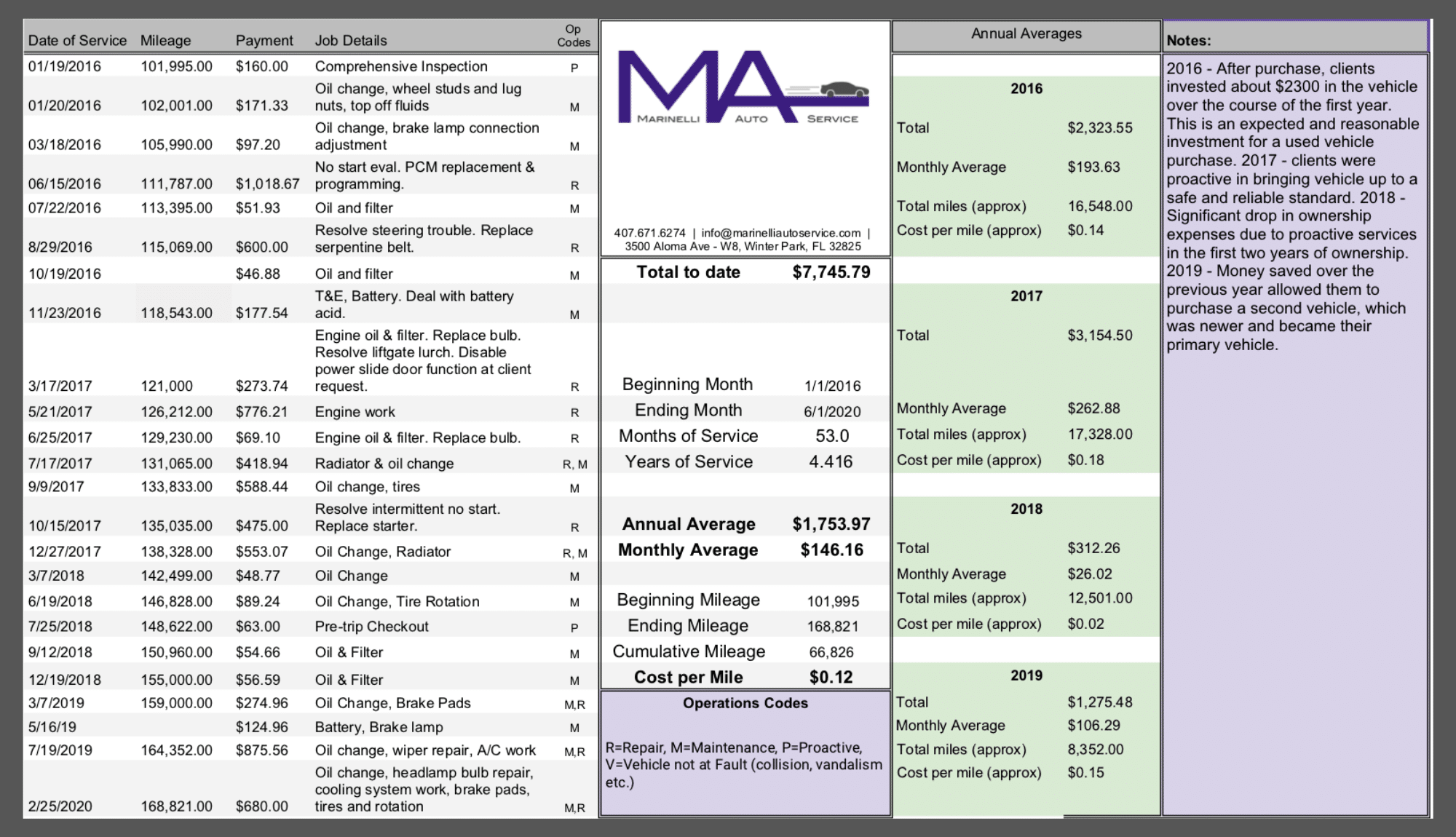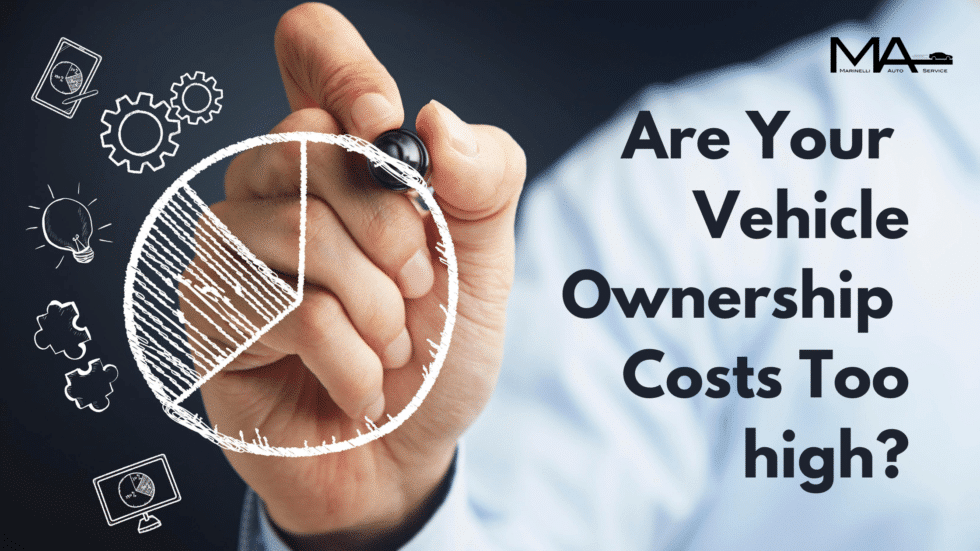“I avoid bringing my car to the repair shop until it’s screaming at me so loud that I can’t ignore it,” commented a brand new client. This isn’t an uncommon mindset among vehicle owners – especially those of “older” vehicles with “some mileage” and a tight budget.
“Why worry if there’s no real way to plan for these unexpected costs?,” many people think.
We helped change the mindset of this client, to their benefit. A proactive, thought-out, budget- honoring approach to vehicle maintenance and repair is a win-win for the client and the repair shop. You can reduce the stress of finding that time and money to address symptoms and surprises. You can catch problems before they get worse or strand you. You can set aside a vehicle ownership budget.
You shouldn’t have to worry about unexpected costs, because you can have a reasonable idea of what you need to save each month to keep your vehicle in a safe and reliable condition. With this money set aside and a proactive plan for repair and maintenance, you can reduce your visits to 2-3 times each year coinciding with oil changes and other necessary maintenance.
How Do I Find My Vehicle’s Average Monthly Cost?
We regularly walk clients through a process of planning out current and upcoming needs in order to create a budget plan. Additionally – and this is key – with a repair and maintenance history, we can formulate a vehicle ownership cost analysis. With the cost analysis, paired with a budget for upcoming needs, we have been able to help vehicle owners keep their list of needs low, reduce their average monthly expenses, and help them set a realistic budget to keep their vehicle safe and reliable. This reduces surprises and their unexpected costs for repairs and maintenance.
A basic explanation of this cost analysis service is that we calculate your total expenses for maintenance and repairs for as long as we’ve serviced your vehicle. We can show you what your average monthly cost has been and help you plan to maintain or reduce that average. This is a benefit for clients who come to us for all of their vehicle’s needs. By having a record of what was done when and how much you paid, we can better advise you on how to budget for the future.

The spreadsheet, pictured above, helps us calculate your vehicle’s average cost to the month. We can look at the vehicle’s trends over years, months, and miles to tell the client if the vehicle’s average cost is reasonable, better, or worse. We can also note an increase in the cost of the vehicle’s needs and advise a client when it’s time to look for a different vehicle. For example, in 2020 the average monthly car payment is about $550 for a new car to $390 for a used car per month, not including interest or maintenance and repairs. The average monthly cost for a paid-off used vehicle should be around $120-$180 if a proactive approach is taken for maintenance and repairs. Over the course of 5 years, that is a difference of $22,200.
Why Should I Consider A Cost Analysis?
We have clients, a newly wed husband and wife, who bought a used vehicle (their only vehicle at the time). It wasn’t in great shape and they needed to put a lot of tender loving care into it for the first year or so. In the third year of their owning the vehicle we did a cost analysis. We found that their average monthly cost went from $200 to $75. They were able to decrease their spending by being proactive in their maintenance and repairs and continue to reap the benefits of increased vehicle reliability and fewer surprises.
How did we guide them in this process? We did a comprehensive inspection of the vehicle when they first bought it and gave them a list of everything they needed to know about the vehicle’s condition. We helped them make a plan to attack prioritized maintenance and repairs while working within their budget. They did a great job of putting away as much of their income as possible to get on top of maintenance and repairs. We saw the vehicle a lot at first, but as they worked down their list, we began seeing it less and less.
We’ve recently talked with them about doing a second inspection. This will confirm the status of the “keep an eye on this” items from their original list and help us continue to help them keep their needs low.
Once the needs on this vehicle subsided, they didn’t reduce their budget for vehicle repair. They kept putting money away as before, but instead of investing it all in more repairs – because there weren’t many – they were able to use it to buy a second vehicle.
If the couple continues to maintain their two vehicles well and they continue to put money away, when it’s time to move on, they will have funds set aside for a replacement vehicle.
When Do I Just Replace The Vehicle?
Many people get frustrated with a string of high dollar repairs and decide to just sell the vehicle and get into something a little newer and with a few less miles. Or, they may see that their odometer is getting up there and think that they will be proactive and replace the vehicle before too many “big” expenses come along. Neither of these situations are generally based on actual numbers, but rather misconceptions about the depreciating value of a vehicle, a “feeling” about their vehicle, or stress over their financial situation.
First of all, we’ve seen vehicles get to 300k miles or more and still be cost-effective to keep. . Mileage alone is not an indicator for the average cost to maintain a vehicle. Additionally, a few bigger, more costly repairs, does not mean that the vehicle is in poor condition. Many times, those investments in higher cost repairs (such as major engine work, for example) are less than replacing the vehicle and affords a second life for what has otherwise been a safe and reliable vehicle. Cars and trucks wear down over time, but if well maintained, are fine tuned machines that can be safe and reliable for many years and thousands of miles.
So, if age, mileage, and a momentary increase in repair costs don’t make your vehicle a candidate for replacement, what does? The answer lies in your cost of ownership.
First, let’s look at what a new or new-to-you vehicle would cost:
- For a quality used vehicle, you should plan, at minimum,$5,000 – $7,000 in total expenses. This involves several factors. For example:
- You purchase a used vehicle for $3,000 – $5,000 (this is generally the low-mid purchase price for a reliable used vehicle)
- The fee for a thorough pre-purchase inspection (helps you to budget maintenance and repairs in the first year or so). Yes, paying a fee for this inspection will help ensure a thorough and detailed result. You generally get what you pay for.
- Plus about $2,000-$3,000 for repairs in the first year (depending on the vehicle’s condition)
- This is your initial investment, but costs don’t end here. However, if you are proactive, they can certainly go down over time.
- A financed new or low-mileage vehicle
- Total of your monthly payment
- Plus maintenance and repairs
The question is, are you able to confidently plan your vehicle’s financial needs for less than it costs to purchase or finance a new(er) vehicle in addition to inevitable maintenance and repairs? The answer to that question is our litmus test for clients who are considering replacing their vehicle. The bottom line is: What will it cost you to replace what you have with something that is just as reliable or better?
“Yes”
If you can maintain a safe and reliable vehicle for less than it would cost to replace your vehicle, including maintaining the replacement vehicle’s condition, then it makes the most financial sense to keep your vehicle.
“No”
If your cost of ownership has increased to the level that it is about the same cost or higher than purchasing a quality used vehicle or financing a new or used vehicle, plus maintenance and repairs, then it is time to move on. This should not be based on, “I feel like my vehicle ownership costs are too much,” but rather, “I’ve looked at the numbers and the costs are higher than they should be.” Start the process of replacing your vehicle.
“Yes, but…”
Now, there is the case where your vehicle just isn’t working for you anymore (and, be honest with yourself, not just because you are bored of the vehicle). Maybe you have a Toyota Corolla but you have child #3 on the way and you need to upgrade to a bigger vehicle. Or, you have a Ford Explorer but it’s just you and all you need your vehicle for is getting around town and maybe a road trip here and there. Andrew would say, “Just get a Corolla!” Maybe buy it from the family upgrading to a bigger vehicle (ha ha).
There are times when you need to move on if the type of vehicle you have just isn’t serving you anymore. If you have a trustworthy mechanic that is knowledgeable about a variety of makes and models, they may be able to direct you to a make and model that will serve you well in your season of life. If you haven’t built a relationship with a trustworthy mechanic, now is the time to find one! Ask friends and family if they have someone they would strongly recommend. If you are in Central Florida, we would be happy for you to give us a ring!
The couple I mentioned above had a monthly cost of ownership that was slightly less than if they were to own a vehicle under a lease or payment plan. As they proactively attended to it’s needs, they positioned themselves to a monthly cost significantly lower than financing a vehicle. They did two things right –
- After we earned their trust over time they looked to us (the professionals) to help plan for repairs and maintenance in a timely manner.
- They were proactive in addressing those needs AND in saving for future maintenance, repairs, and funding for their next vehicle.
If you are like me, you find budgeting to be stressful – making sure you have allocated your income in the wisest way for you/your family with enough cushion for surprises. The tighter your budget, the more difficult it is to plan for “the unknown.” However, if you have a good mechanic who gives reliable input in a way that you value and understand, this can take you a long way. In addition, if you can work with that auto repair shop to evaluate your cost of ownership and have a thorough inspection of your vehicle so that you know what your upcoming needs are, you will have so much more confidence in the money you are saving and where the money is going when it comes time for maintenance and repairs.
Marinelli Auto Service is an auto repair shop in Winter Park, Florida. We’ve been serving Central Florida since 2015. We provide maintenance and repairs for a variety of makes and models.
